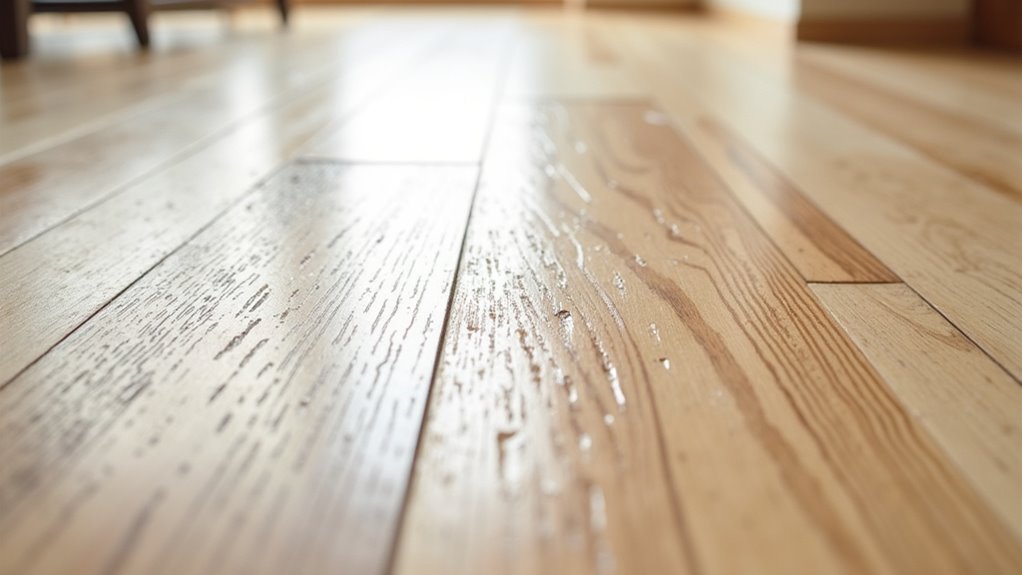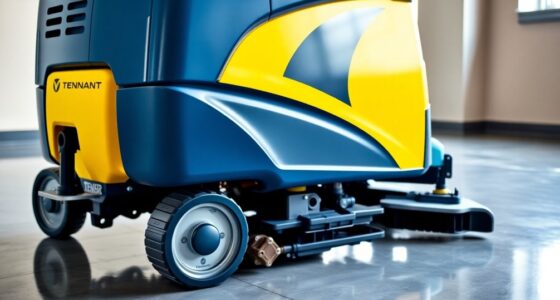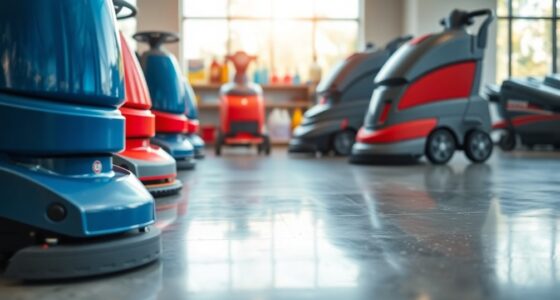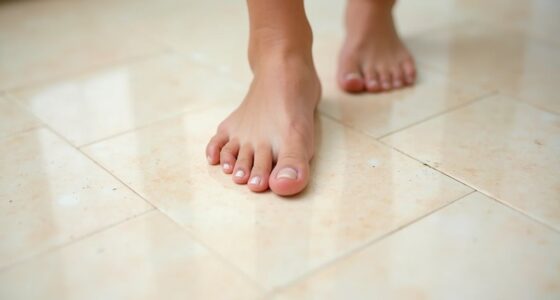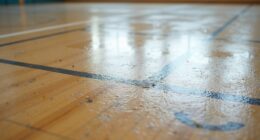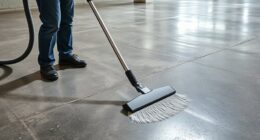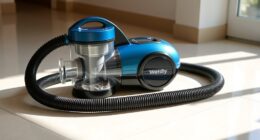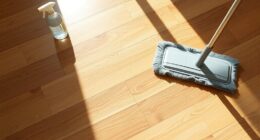Using the wrong scrubber on your vinyl plank floors can cause scratches, dullness, and long-term damage. Avoid abrasive tools like steel wool or harsh scrub brushes, and opt for soft microfiber or cotton mops instead. Scrubbing too hard or too often can wear down the surface. To keep your floors looking their best, learn how proper tools and techniques can make a big difference in maintenance. Continued care tips await to help you protect your floors.
Key Takeaways
- Using abrasive scrubbers or hard-bristled tools can scratch and dull vinyl planks; switch to soft microfiber or cotton mops.
- Excessive scrubbing or applying too much pressure damages the surface; clean gently and avoid aggressive scrubbing.
- Not rinsing or drying properly after scrubbing can leave residues or cause streaks; always rinse with clean water and dry thoroughly.
- Ignoring routine cleaning leads to dirt buildup, which scratches the surface during scrubbing; maintain a regular cleaning schedule.
- Using harsh chemicals or overly aggressive cleaning products can degrade vinyl; select gentle, vinyl-safe cleaning solutions.
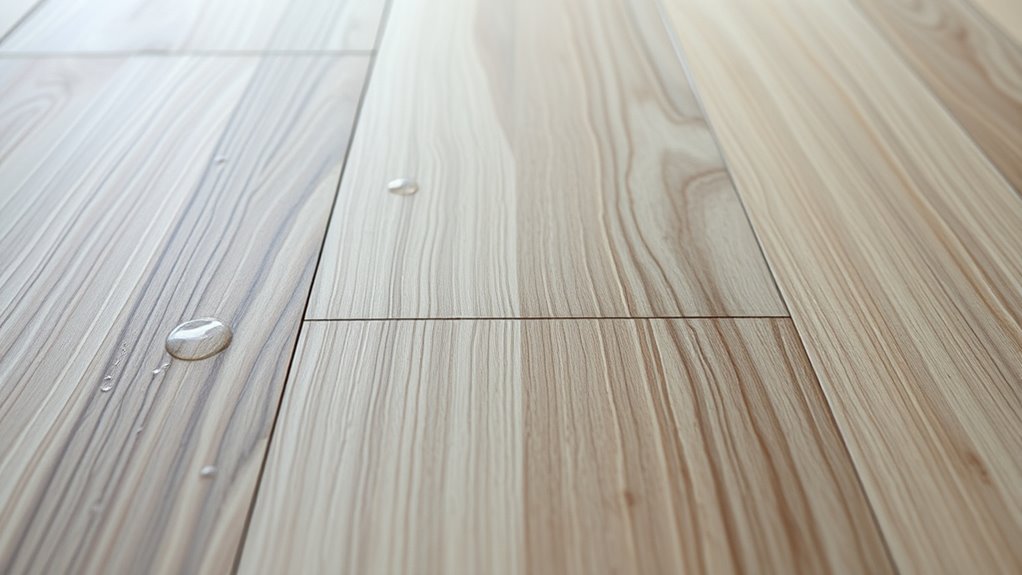
Cleaning vinyl floors with a scrubber can be effective, but if you’re not careful, it can lead to mistakes that damage the surface. One common mistake is using the wrong mop selection. Not all mops are suitable for vinyl planks, especially when paired with a scrubber. You want a mop that’s gentle yet effective—microfiber mops are usually the best choice because they clean thoroughly without scratching or dulling the vinyl. Avoid using rough or abrasive mops, as they can leave scratches or even peel the surface over time. Also, steer clear of mops with hard bristles, which can cause permanent damage. Choosing the right mop ensures your scrubbing routine cleans well without harming your floors.
Use microfiber or soft cotton mops to clean vinyl floors safely and effectively.
Another mistake relates to cleaning frequency. Many people underestimate how often vinyl floors need cleaning or, conversely, clean too frequently with harsh tools. Over-cleaning with a scrubber can wear down the top layer of your vinyl, leading to dullness and reduced longevity. On the other hand, infrequent cleaning allows dirt and grit to build up, which can act like sandpaper during scrubbing and cause scratches. It’s best to establish a consistent cleaning schedule—generally, sweeping or dry mopping daily and damp mopping every week with a gentle cleaner. This routine keeps dirt at bay and minimizes the need for aggressive scrubbing, reducing the risk of damage.
Additionally, understanding the importance of exploration and curiosity can help motivate proper maintenance and care routines, as it reminds us to appreciate the durability and beauty of well-cared-for vinyl floors. When you select a proper mop and stick to an appropriate cleaning frequency, you’re less likely to make common mistakes that could harm your vinyl floors. Using the right mop selection means choosing tools designed for delicate surfaces—microfiber or soft cotton mops—and avoiding anything too abrasive. Regularly cleaning your floors as part of your routine prevents dirt buildup, so you don’t have to rely on aggressive scrubbing to remove stubborn stains or debris. Remember, vinyl floors are durable but not indestructible. Overusing a scrubber, especially with improper tools or too often, can lead to dullness, scratches, and peeling.
To keep your vinyl floors looking their best, think about your mop choices and how often you clean. By selecting a gentle, appropriate mop and maintaining a consistent cleaning schedule, you’ll reduce the risk of damaging your floors. Scrubbing is useful, but only when done correctly. Proper maintenance isn’t just about cleaning; it’s about preserving the surface’s integrity. When you pay attention to these details, your vinyl plank floors will stay beautiful and durable for years to come.
Frequently Asked Questions
Can Using a Steam Cleaner Damage Vinyl Plank Floors?
Using a steam cleaner can pose risks to vinyl plank floors if you’re not careful. The high heat and moisture may cause warping or delamination over time, jeopardizing vinyl floor safety. To avoid damage, make certain your steam cleaner has adjustable settings and keep the temperature low. Always test a small, hidden area first, and don’t hold the steam in one spot too long. This way, you protect your floors while cleaning effectively.
How Often Should I Deep Clean My Vinyl Floors?
Oh, you’re probably wondering how often you should deep clean your vinyl floors—well, it’s not a secret society’s ritual, just a good cleaning schedule. Aim for deep cleaning every 4-6 months, depending on foot traffic. Keep your mopping frequency consistent—perhaps weekly or biweekly—to prevent grime buildup. Skip this, and you’ll end up with dull, sticky floors, which is almost as bad as forgetting your morning coffee.
Are Homemade Cleaning Solutions Safe for Vinyl Planks?
Homemade cleaning solutions can be safe for vinyl planks if you use gentle ingredients like vinegar and water, but be cautious of chemical risks from harsh components. Always dilute vinegar properly, and avoid using bleach or ammonia, which can damage the surface. That’s because some homemade cleaners might seem safe but can cause discoloration or wear over time. Stick with mild, tested recipes to protect your floors effectively.
What Are Signs of Damage From Improper Scrubbing?
If you notice scratches or discoloration from scrubbing, it’s a sign you’ve used too much pressure or a harsh scrubber. Scrubber scratches damage the surface and can cause the vinyl to look dull or discolored. To avoid this, use a soft-bristled brush or microfiber pad, and scrub gently. Regularly inspect your floor for signs of damage, and adjust your cleaning method to keep your vinyl plank floors looking their best.
Does the Type of Scrubber Pad Affect Vinyl Floor Longevity?
Imagine your vinyl floor as a delicate canvas; the scrubber pad material truly matters. If you choose a rough or abrasive pad, it can scratch and wear down your floors over time, reducing their lifespan. For best vinyl floor care, opt for soft microfiber or non-abrasive scrubber pads. This gentle approach preserves your flooring’s integrity, keeping it looking fresh and vibrant longer. The right pad ensures durability, beauty, and peace of mind.
Conclusion
To keep your vinyl plank floors looking their best, avoid these common scrubber mistakes and try the easy fixes. Remember, using the right cleaning methods can extend the life of your floors considerably. Did you know that improper cleaning can reduce a vinyl floor’s lifespan by up to 30%? By being mindful and gentle, you’ll preserve their beauty for years to come. So, take care with your cleaning routine—you’ll thank yourself in the long run!
